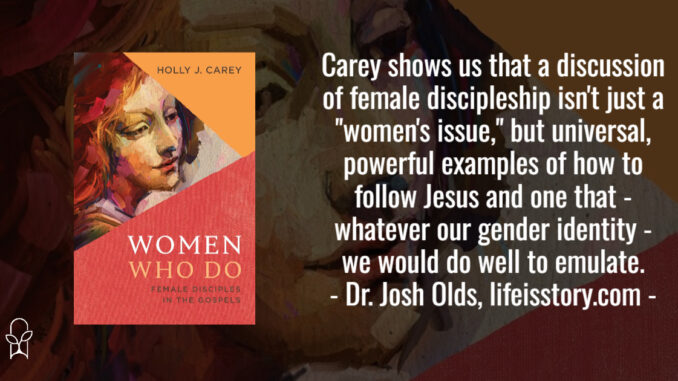
Published by Eerdmans on October 24, 2023
Genres: Academic, Non-Fiction, Theology
Buy on Amazon
Goodreads

Meet the women who followed Jesus even when the Twelve failed.
To be a disciple is to follow Jesus. And that requires action. But in the gospels, the disciples often falter. The Twelve even abandon Jesus at his crucifixion in many of the narratives. Yet it is female disciples who remain faithful to Jesus to the end. What do we make of this?In Women Who Do, Holly J. Carey examines what it means to be a disciple—and contends that it’s the women who best embody discipleship in the gospels. Carey describes the expectations and social roles for women in first-century Greco-Roman and Jewish contexts. Then she offers a close reading of each of the four gospels, as well as Acts of the Apostles. What emerges is a cohesive narrative-critical case that the Twelve are not an equivalent group to the disciples. In fact, the Twelve are set as foils against the faithful, active, and often nameless disciples who populate the narratives—many of whom are women.
Women Who Do is essential reading for students and scholars seeking a fuller understanding of women’s roles in Jesus’s ministry. Carey’s argument not only clarifies the narrative of the gospels but also raises questions about how the church conceives of women’s leadership today.
It is the year of our Lord 2024 and there is still somehow a debate over the influence, impact, and importance of Jesus’s female disciples. Holly J. Carey’s Women Who Do makes a pretty strong case that not only did Jesus have female disciples, they often embodied what it meant to be a disciple better than their male counterparts. Carey writes that the genesis of this book was a presentation she did for the SBL Mark seminar, where she reviewed the actions and behaviors of Jesus’s disciples and found that “it was the women around Jesus who best displayed the qualities of discipleship.” This book expands that exploration beyond Mark and into the other Gospels and the book of Acts.
Women Who Do is comprised of eight straightforward chapters: one chapter of introduction, one chapter for a conclusion, one to contextualize the role of women in first century Near Eastern culture, and one chapter for each of the five books of the Bible that Dr. Carey explores.
My one criticism of the book would be the way in which Carey approaches her examination of female discipleship. She is a biblical scholar—chair of the Biblical Studies department at Point University—so perhaps this is to be expected, but she examines female discipleship book by book. First Mark, then Matthew, then Luke, then Acts, then John. Mark first because that’s where the theme is most prominent (and what jumpstarted the book) and then Luke and Acts together because Luke wrote both. The story of the Gospels is the same story, meaning that approaching it book by book creates some amount of repetition. I found myself thinking that I would be able to follow the narrative better if the approach had been topical to talk about specific women or groups of women or even been broken down by specific narratives that would include perspectives from all salient books. I think that reconfiguration could have made the book’s overall point stronger and more obvious.
There is also something of an “us vs. them” theme that arises out of Carey’s work. As stated from the outset, Women Who Do doesn’t just make the case that women were disciples, but that women were often better examples of discipleship than the Twelve predominant male disciples who followed Jesus (and wrote a couple Gospels). It would be easy to lapse into stereotypes or overplay the argument to build up the historically undervalued role of women by demeaning the men who followed Jesus. Fortunately, Carey avoids this, maintaining an academic and bias-free tone. The purpose in identifying the quality of the women’s discipleship is not to denigrate Jesus’s male disciples, but to showcase the important of recognizing the importance of Jesus’s female disciples. When we fail to consider the women in the life of Jesus, we not only miss out on an example of female disciples, we miss out on the example of very good disciples. The female disciples of Jesus are exceptional, not because of their gender but because of their commitment to Christ.
And that’s where I’d leave Women Who Do. The issue of female discipleship or women’s roles in the church often get shoved into a niche of “women’s issues.” Carey shows us that the example of the women in Jesus’s life are much more than that. They are universal, powerful, lived examples of how to follow Jesus and—whatever our gender identity—we would do well to follow in their footsteps.
